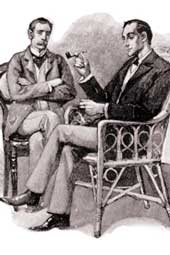|
|
It’s a funny old language, is English. As in the last two words of that sentence, you can at times reverse the normal word-order of subject and verb. Equally, you can at times reverse the normal sequence of verb and object. But not at just any time you please. Because in English word-order is unusually important.
Few English-speakers are aware of that. From our infancy we’ve known that the natural order for a statement is, say, He is alive, and for a question Is he alive?. The same is true in French, curiously, but not in Spanish or Italian, nor in Latin from which all those languages derive. The Italian who says E morto il Papa may be telling you the Pope is dead, or asking you a question, is he dead? Only the inflexion of the voice or, in print, a question-mark reveals which is intended.
True, we can do likewise in English, with a note of interrogation or, often, cynicism: So you enjoy paying taxes?. But that is rare. Yet in many languages it is standard form; those of India, I’m told, Sanskrit included. (Hence, I suppose, the standard Hinglish form of a question: a statement followed by isn’t it?, to make plain to even the reddest-faced Englishman that it is really a question he is being asked.)
Much-inflected languages have an astonishing freedom of word-order. The ancient Greek and Roman poets used almost any order that fitted their metre. There is a once well-known line of Virgil much cited to Victorian schoolboys, indeed to me, for the way it matched sense with rhythm: Quadripedante putrem sonitu quatit ungula campum; with four-footed sound the hoof beats the dusty plain. Or, word by word: With four-footed... the dusty... sound... beats... hoof... the plain. Not even the wildest English poet can go that far.
Yet we do vary word order. Poets cheerfully invert verb and subject, as in Shakespeare’s Where the bee sucks, there suck I; or Coleridge’s In Xanadu did Kubla Khan...; or Edward Lear’s Far and few, far and few, are the lands where the Jumblies live. Biblical language does it: In my father’s house are many mansions. And common speech does it, for emphasis: Into the room came Jack and Jill. Here what matters is not what Jack and Jill did, but who came into the room.
Yet, I know no similar justification for the commonest use of all, in reporting dialogue. “My dear Holmes,” said I, “I fail to see how you work it out.” “It is simplicity itself,” said he. To the great detective, in his first recorded conversation with Dr Watson, maybe so. Not to me.
Placing the object in front of the verb is rare, but again useful to give emphasis: Contempt he could ignore; an insult, never. That phrase I think I’ve borrowed from Ouida, arguably the 19th century’s worst successful novelist (but any better authenticated source happily will I acknowledge, if my meaning you get, which is almost more than I can). Yet do not mock. Carried to excess, as I’ve done there, playing around with word-order is plainly ridiculous. But properly employed it’s a valuable device, that sharpens what you’re saying.
As with most devices, the secret is to do it in the right place, and not too often. Disobey that advice, and you will deserve the familiar mockery once directed at the (then) style of the American news-magazine Time. It ends with the words ...and backwards reels the mind.












